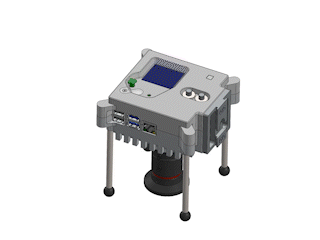Raspberry Pi Release 3D Printable Astro Pi Case
3D Print in plastic, much easier than aluminum
Anyone who watched the Astro Pi computers blast off to the International Space Station, and longed to get in on the space experimentation action, will no longer have to build their own rocket - as Raspberry Pi has released a 3D-printable Pi case almost identical to those now in orbit but for a lot less money.

Almost identical except that they’re made out of plastic extruded by a 3D printer, and not aluminum like the originals, which act as both protection and passive cooling for the weightless wonders. Raspberry Pi has released a guide and model for 3D printing and assembling replica Astro Pi cases, so you can sit by a circular window and strum Space Oddity on your guitar while exploring the possibilities of the new Sense HAT Version 2, or just get some great shots with the High Quality Camera module.
The guide contains all the 3D printing files you’ll need to complete the case, as well as step-by-step instructions for the internal wiring and soldering needed to get the Astro Pi up and running. Improvements over the first version of the case include creating the upper and lower body segments as single parts, rather than splitting them, and the print has been tested on a range of printers.
Four variants of the upper case half are available, for use depending on which PIR sensor you choose to put in your Astro Pi. Those taking part in the European Astro Pi Challenge can use the same one sent to space, while those who just want the motion detector capability can use a cheaper sensor. A version with smaller holes for push-buttons is also available, to save more cash. A custom version of the Astro Pi’s self-test software is also being released, so you can check everything is operational after assembling your spacefaring computer.
The original Astro Pi case was one of the most popular 3D printing guides produced by Raspberry Pi, and saw cases created in multiple colors and even glow-in-the-dark plastic alongside those that could be spray-painted to match the aluminum finish of the original.
The new Astro Pi units, which we discussed in detail on The Pi Cast, comprise of a Raspberry Pi 4 with a High Quality Camera and the Sense HAT Version 2, will run experiments written by schoolchildren and return images of Earth. They also come with a Google Coral machine learning accelerator, which experimenters are using to predict the weather and simulate the growth of mold.
Get Tom's Hardware's best news and in-depth reviews, straight to your inbox.

Ian Evenden is a UK-based news writer for Tom’s Hardware US. He’ll write about anything, but stories about Raspberry Pi and DIY robots seem to find their way to him.